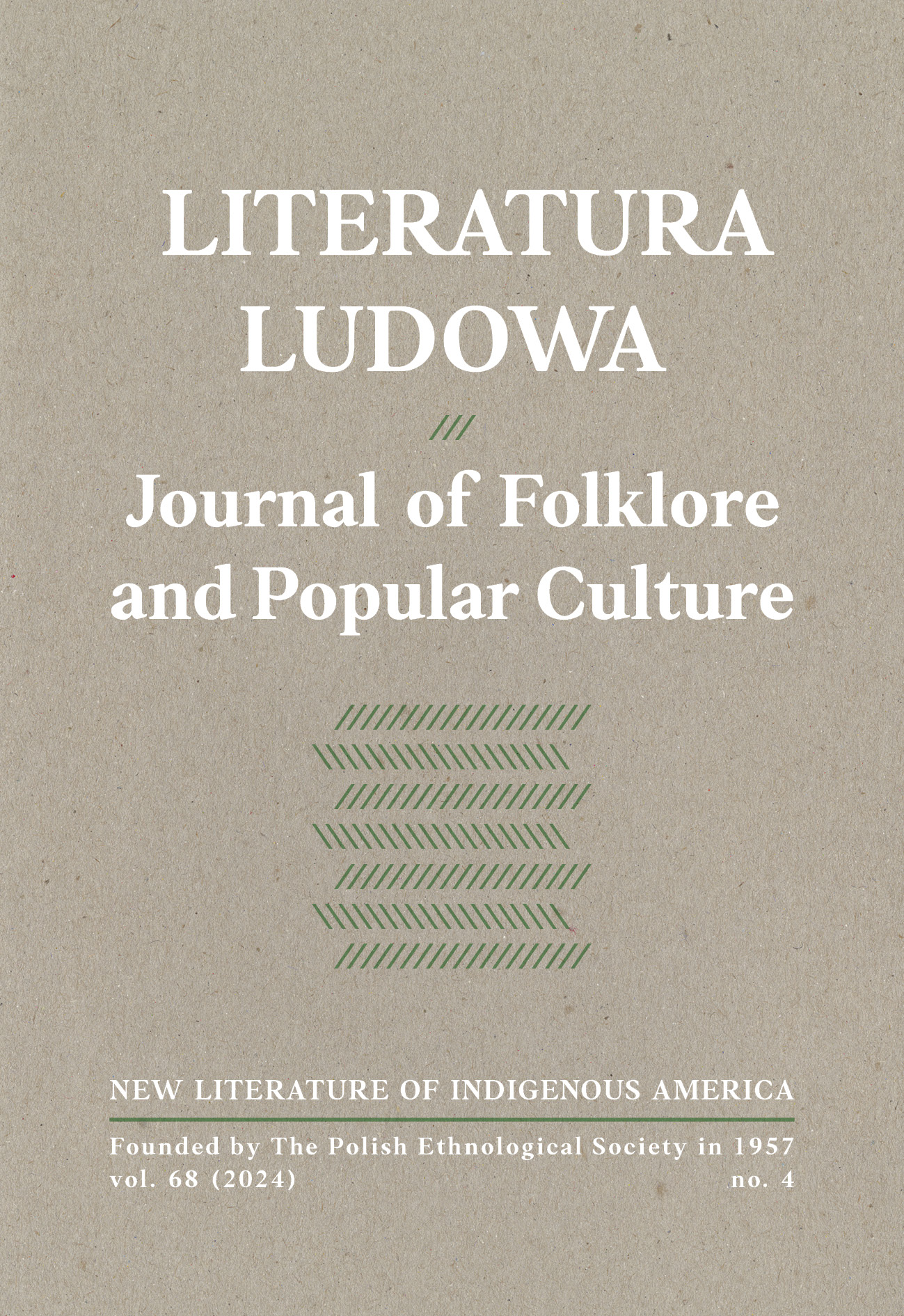Care and Humor in Contemporary Indigenous Literature: Personal Readings
DOI:
https://doi.org/10.12775/LL.4.2024.007Keywords
Native American literature, care, humor, literary anthropologyAbstract
Today, literature written by women and men from Indigenous communities from the United States and Canada cannot be limited to collections of nostalgic poetry, anthologies of sublime speeches or picturesque selections of myths and legends. This literature touches on almost all topics typical of contemporary word art, undoubtedly belonging to the “world republic of literature”. The thesis of the article is that two clear themes for this literature can be identified, which are also important for external recipients. These are: a deeply felt concern for the environment and a particular sense of humor. This thesis has been illustrated with examples of prose and poetry by Natalie Diaz, Inés Hernández-Ávila, Thomas King, Tomson Highway, and Adam Fortunate Eagle. Their works go beyond the patterns present in standard realistic prose, beyond the preferences of the publishing industry, presenting a different, “organic” view of the world.
References
Astley, N. (ed.) (2020). Staying Human. Poems for Staying Alive. Bloodaxe Books Ltd.
Atalay, S. (2012). Community-based archaeology: research with, by, and for indigenous and local communities. University of California Press.
Deloria, V. Jr. (1992). Foreword. In A. Fortunate Eagle, Alcatraz, Alcatraz! The Indian Occupation of 1969–1971. Heydey Books.
Diaz, N. (2018). The First Water Is the Body. In H. E. Erdrich (ed.), New poets of native nations (pp. 99–105). Greywolf Press.
Erdrich, H. E. (ed.) (2018). New poets of native nations. Greywolf Press.
Fortunate Eagle, A. (2014). Scalping Columbus and Other Damn Indian Stories. Truths, Halftruths, and Outright Lies. University of Oklahoma Press.
Fortunate Eagle, A. (2023). Pipestone. Życie w szkole z internatem dla Indian (tłum. B. Hlebowicz). Tipi.
Fishkin, S. F. (2005). Crossroads of Cultures: The Transnational Turn in American Studies. American Quarterly, 57(1), 17–57.
Hernández-Ávila, I. (2023). En el jardín del espíritu—with my helper, Chámis. American Anthropologist, 125(3), 694–699.
Highway, T. (2022). Laughing with the Trickster. On Sex, Death, and Accordions. Anansi Press.
Jay, P. (2010). Global Matters. The Transnational Turn in Literary Studies. Cornell University Press.
Johnson, J. (2013). In conversation with Tomson Highway. Macleans. https://macleans.ca/culture/in-conversation-with-tomson-highway/
Kelly, C. R., Black, J. E. (eds.) (2018). Decolonizing Native American Rhetoric. Communicating Self-Determination. Peter Lang.
King, T. (2021). Indians on Vacation. A Novel. HarperCollins Publishers Ltd.
Kuligowski, W. (2020). Nowa poezja tubylczej Ameryki. Jaka rzeka płynie przez ciało NDN? Teksty Drugie, 5, 196–215.
LaPointe, S. t. (2022). Red Paint. The Ancestral Autobiography of a Coast Salish Punk. Counter Point.
McCaffrey, L. (2004). Fikcje teraźniejszości (tłum. A. Krawczyk-Łaskarzewska). W: A. Preis-Smith (red.), Kultura, tekst, ideologia. Dyskursy współczesnej amerykanistyki (s. 351–373). Universitas.
Mallon, F. E. (2011). Decolonizing Native Histories. Collaboration, Knowledge, and Language in the Americas (trans. G. McCormick). Duke University Press.
McKearney, P. (2020). Challenging Care: Professionally Not Knowing What Good Care Is. Anthropology and Humanism, 45(2), 223–232.
Propp, W. (2016). O komizmie i śmiechu (tłum. P. Knyż). Nomos.
Stevenson, L. (2014). Life beside Itself: Imagining Care in the Canadian Arctic. University of California Press.
Waziyatawin, A. W., Yellow Bird, M. (eds.) (2005). For Indigenous Eyes Only: A Decolonization Handbook. School for Advanced Research Press.
Waziyatawin, A. W., Yellow Bird, M. (eds.) (2012). For Indigenous Minds Only: A Decolonization Handbook. School for Advanced Research Press.
Downloads
Published
How to Cite
Issue
Section
License
Copyright (c) 2025 Waldemar Kuligowski

This work is licensed under a Creative Commons Attribution-NoDerivatives 4.0 International License.
1. The authors give the publisher (Polish Ethnological Society) non-exclusive license to use the work in the following fields:a) recording of a Work / subject of a related copyright;
b) reproduction (multiplication) Work / subject of a related copyright in print and digital technique (ebook, audiobook);
c) marketing of units of reproduced Work / subject of a related copyright;
d) introduction of Work / object of related copyright to computer memory;
e) dissemination of the work in an electronic version in the formula of open access under the Creative Commons license (CC BY - ND 3.0).
2. The authors give the publisher the license free of charge.
3. The use of the work by publisher in the above mentioned aspects is not limited in time, quantitatively nor territorially.
Stats
Number of views and downloads: 374
Number of citations: 0



